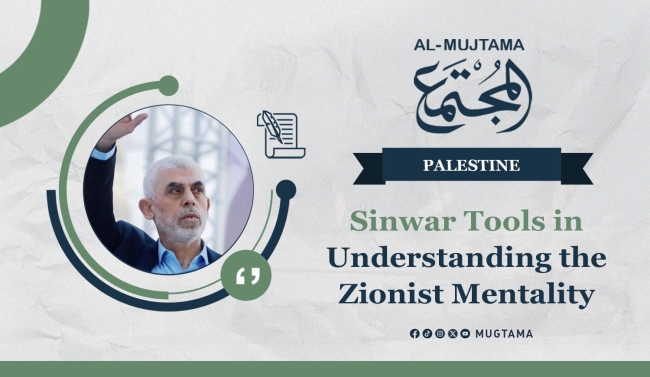Sinwar Tools in Understanding the Zionist Mentality Featured
Yahya Sinwar has emerged as one of the most important Palestinian leaders who have succeeded in deeply understanding the Zionist mentality, starting from inside the prisons, where he spent time learning the language of the enemy and understanding their culture and history, allowing him to access the strategies of the occupation and its orientations.
He relied on a set of methods to exploit the weaknesses of the enemy for the sake of the Palestinian cause, including:
1- The enemy's language:
Sinwar learned Hebrew during his time in prison, a step that enabled him to access texts and information that most Palestinians cannot access or understand. Understanding the language not only involves reading and writing, but also includes understanding the culture and social and political context it carries.
Through this learning, Sinwar was able to identify the leaders of the occupation on one hand, and benefit from the available information that reveals their ways of thinking and behavior.
Here, the necessity of mastering the language to understand texts related to adversaries is highlighted.
In a hadith narrated by Zaid bin Thabit: The Messenger of Allah (peace be upon him) commanded me to learn a Jewish book. He said: “I swear by Allah I do not trust Jews in my book,” he said: “It did not pass me half a month until I learned it for him. He said: “When he wrote to the Jews, I wrote to them, and when they wrote to him, I read their letter to him.” (Sunan Al-Tirmidhi).
2- Study of the history of the Zionists:
Sinwar benefited from reading the intellectual and historical works of Zionist movement leaders, allowing him to understand the strategies and policies followed by "Israel" over the decades.
The British Financial Times mentioned that after learning Hebrew, Sinwar was able to read the Israeli mind well and delved into reading the thoughts of Zionist movement leaders, such as Ze'ev Jabotinsky, Menachem Begin, and Yitzhak Rabin, contributing to building effective resistance strategies.
3- Personality analysis:
The Zionist entity failed to understand Sinwar's personality and was unable to read his movements correctly.
According to the Financial Times, despite "Israel's" 40 years of experience in dealing with the leader of Hamas in Gaza, the incorrect reading of his personality led to the biggest intelligence failure.
It was considered that the "Israeli" experience in dealing with Sinwar only led to appeasing the Israeli security leaders, giving them a false sense of self-satisfaction, as the newspaper expressed.
Michael Milstein, a former Israeli military intelligence officer and expert in Palestinian affairs, told the British newspaper: "We did not understand him at all," referring to Sinwar.
4- Translations:
Sinwar translated books related to Israeli security agencies, such as "Shin Bet in Shreds" by Carmi Gilon, which delves into the role of the Israeli internal security apparatus, a strategic important step.
These translations not only increased the awareness of Palestinian prisoners, but also provided them with information on how Shin Bet thinks and operates in dealing with security issues.
5- Smart Negotiation and Exploiting Weaknesses:
By understanding the mentality of the Israeli society, Sinwar was able to exploit weaknesses, such as the social pressure associated with military service, where soldiers are prominent figures in Israeli society, Sinwar utilized this weakness as a strength in his strategy by understanding how the captivity of soldiers can affect the mentality of the society.
Yoval Biton, a former head of Israeli prisons who spent some time with Sinwar, mentioned that what Israel considers a strength - most Israelis serving in the army and soldiers holding a special place in society - is a weakness that can be exploited.
The Wall Street Journal also noted that the accuracy of Sinwar's idea was proven in 2011 when one Israeli soldier was released in exchange for 1027 Palestinian prisoners.
It is considered that Sinwar currently holds 138 Israelis, including soldiers, and is betting that he can release thousands of Palestinian prisoners and achieve a permanent ceasefire based on his understanding of Israeli society.
He managed to present himself as a calm and negotiable leader, which helped him deceive his enemies, pretending to seek peace and having a long-term political and social vision, fooling them until his release in the known Shalit deal in 2011.
In one of his interviews with the Israeli media at the end of the Palestinian uprising in 2005, he spoke in Hebrew, saying: "Despite our non-recognition of Israel, we are ready for a long-term ceasefire."


